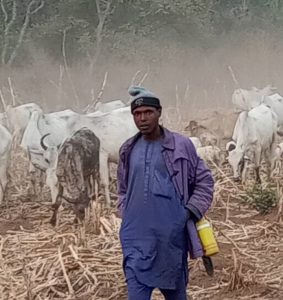By Shehu Uthman

A report by the International Livestock Research Institute (ILRI) revealed that Nigeria’s livestock sector plays a vital role in the economy, contributing about 17% of the agricultural GDP and 5% to the national GDP.
However, cattle rearing—being a segment of the broader livestock farming industry—faces numerous challenges that threaten the stability of the nomadic communities. Sadly, nomadic migration has been surging in recent decades, thanks to the drive by land scarcity and insecurity, which has painted a grim picture in the sector.
An encounter with a leader of a nomad, popularly known as Mallam Musa at Baruten Local Government, Kwara State, shows that the cattle rearing is now facing some significant setbacks, unlike how it was before.
“The number of cattle I had ten years ago has decreased significantly due to the lack of frequent calf deliveries as a result of the scarcity of grasses,” Mallam laments bitterly. “This problem doesn’t affect me alone but all nomads practicing the extensive system of rearing animals.”
Mallam Musa further explained that the difficulty of rearing them has significantly increased—thanks to the increase in agriculture. “For example, all you can see around are many farmlands for farming; we have no cattle land to rear our cattle.
“Everywhere is farmland, and the government does not assist us in any way for our progress, unlike farmers. This means we are not being taken care of… I am not happy leaving my country, but I have no alternative,” he concluded.
Insecurity and Loss of Livelihoods
Mallam Musa is not alone. Ardo Gide, who is a leader of the Fulani in Wagana, also stated that most Fulbe are migrating due to a lack of grazing areas.
“Some years back, one person could rear 100 cattle, but today, five people or more cannot rear the same number,” he said. “They cannot practice intensive rearing because it is costly; as such, they prefer to migrate.”
Ardo Gide also said further that many are fleeing for their lives because of insecurities, as some unscrupulous kidnappers are fond of seizing their cattle and also killing them in the act.
Rising Population Puts Pressure on Grazing Land
Umar Beni is an educated nomad who studied accounting. He attributed the problem of insufficient grazing land to overpopulation in Nigeria. He said that the grazing land keeps reducing as the population keeps increasing.
“And for the insecurity,” he said, “those fleeing from the northern part of Nigeria in fear of thieves have no option but to migrate to other countries where they feel safe and protected.”
Umar Babi believes that if the government can resolve these problems, particularly in the north, by preventing the confiscation of animals, most Fulani would not migrate to other countries, leaving their homeland.
He emphasized that most nomads are uneducated, and their primary source of livelihood is animal rearing. They cannot sit idly while their animals are confiscated, leaving migration as their only choice.
However, Alhaji Dan Baggallema has a counter opinion. He believed that moving to other countries does not solve the problems faced by nomads but instead worsens them. In a new environment with new rules, nomads are often labeled as strangers.
For him, he would rather stay in Nigeria, sell half of his cattle, and build a house in the town or city than migrate to other countries where he will have no value, lose his fundamental human rights, and be unable to practice his religion freely.
He added, “Many who went to Ghana are already planning to return to Nigeria after migration proved futile due to unendurable rules and other challenges in the host country.”
